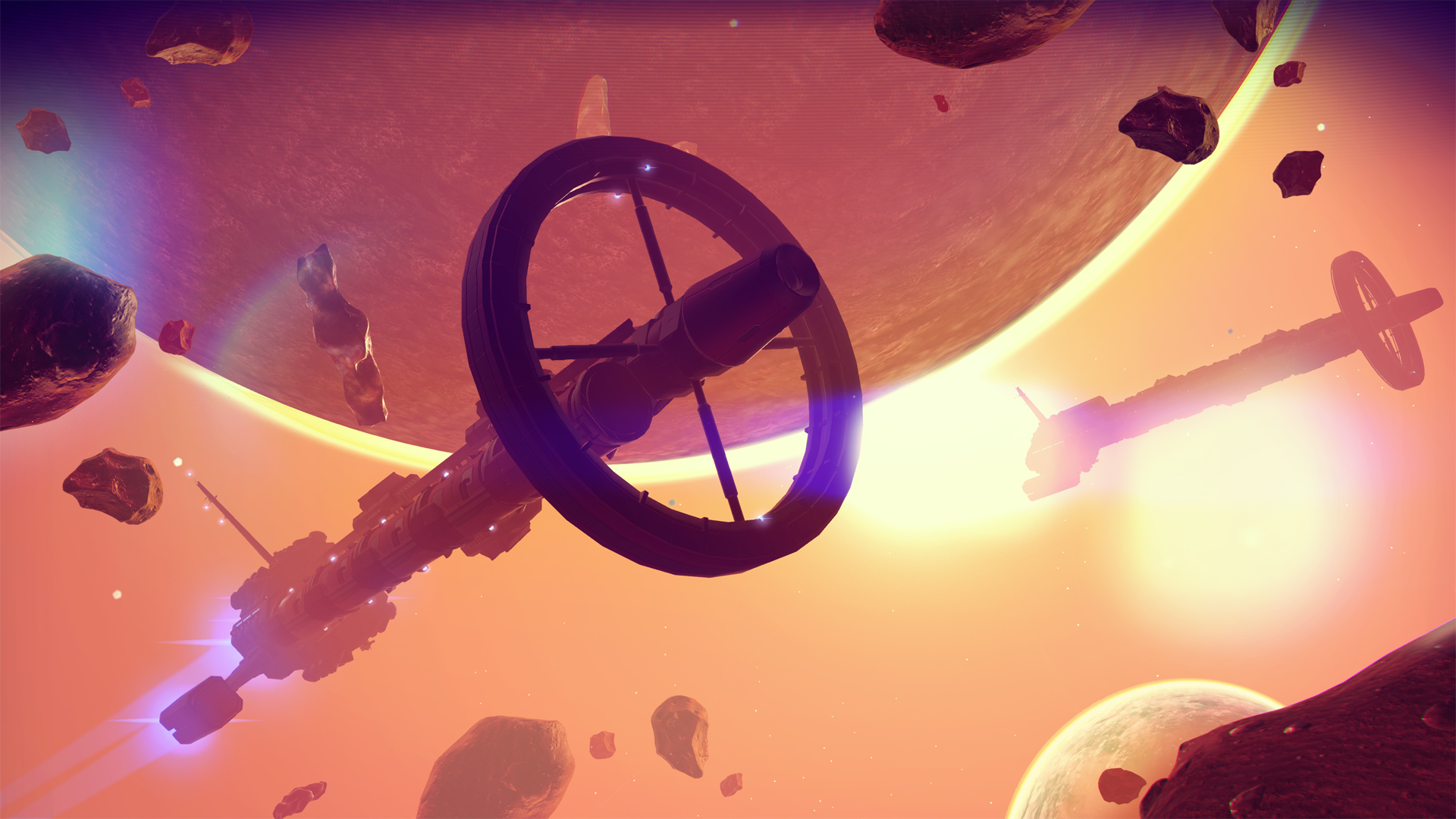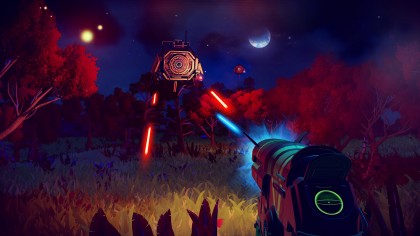No Man's Sky might be a directionless game, but does that make it a pointless game?
When meaninglessness is fun

Sign up for breaking news, reviews, opinion, top tech deals, and more.
You are now subscribed
Your newsletter sign-up was successful
No Man's Sky is different than 99% of games out there. It's not about racing to the end of the universe to kill a final boss or about finding the highest level gear. Ultimately, it's a game which requires you to forget about the destination in order to enjoy it.
It's a game which is all about the journey, about the joy of exploration rather than the joy of reaching a goal and, if you go into No Man's Sky with the expectation that it will lay out a clear path for you to follow, then you'll be sorely disappointed.
It's a game that delights in hiding its secrets, where you might spend hours playing and only be rewarded with five minutes of excitement. And some find that design decision polarizing.
Some gamers have lamented that the lack of direction makes No Man's Sky a bad game, unworthy of its price tag. Others, like The Guardian's Keith Stuart, have fallen in love with this directionlessness.
In a post published last week, Stuart wrote, "there's little point to No Man's Sky, beside the promise of some narrative event at the centre of the universe. You drift from planet to planet, mining, selling and buying; there are little compulsion systems that prod you toward increasing your inventory size and following astral paths through the glittering cosmos, but you don't have to."

Direction for the direction-less
Stuart's primary talking point is that certain people, myself included, have reacted negatively to this failure of No Man's Sky to give you direction, to offer you clear goals that give your play a feeling of progress when you play and how that animosity is misdirected.
And, on some level, I agree with him: Exploration can be fun. Some of the greatest games of all-time didn't give you an immediate goal. But herein lies No Man's Sky's problem – it asks you explore the world without direction, and yet only offers paltry rewards for your efforts.
Sign up for breaking news, reviews, opinion, top tech deals, and more.
But exploration shouldn't go unrewarded.
For an example of how to achieve this feeling of progress when combined with a game that's all about exploration, you need look no further than the clunkily-named genre of Metroidvanias.
I've written previously about my love of this genre, which was pioneered by the Metroid and Castlevania series of games (hence the name), and is based around the idea of teasing you with the sight of inaccessible areas hours before you'll ever be able to acquire the equipment you need to be able to reach them.
Guided exploration, ftw
In Super Metroid this means that you'll often come across doors that require a beam of a certain color to unlock. Further into the game you'll then acquire said beam, and your mind will immediately turn to all those previous locations which you can now return to and explore as a result of your new discovery.
I love this feeling of progress. It's the fact that you begin the game with nine out of ten directions locked off to you but which slowly become unlocked over the course of play until the entire map is open to you.
A game like Metroid incentivises you in a really clever way. It shows you paths that are inaccessible to you, which makes you want to find the upgrade that will allow you to one day gain access.
In other words it shows you the obstacle before giving you the means to overcome it.

This contrasts with No Man's Sky, where you're rarely presented with an obstacle prior to the upgrade needed to overcome it. I wander aimlessly for hours in No Man's Sky, waiting for some challenge to crop up which I need a new upgrade to overcome, but nothing is ever presented to me.
Instead I end up browsing the upgrades that are available to me, looking for something that will allow me to achieve something that is currently impossible, but because No Man's Sky gives you no direction, there is never an upgrade that seems worth heading towards.
So I can't find the point in hunting down and mining more materials. The game gives no indication that any upgrade would be worth my while to acquire. There are no enemies that I need a more powerful weapon to defeat and the only locked doors require Atlas keys, which is more of a storyline item than something you need to explore to discover.
"No point and no direction"
In his article, Stuart writes that "gamers are furious about the lack of direction in the game, the lack of point, the lack of meaning, the lack of recognition...many of the angry comments about the game are expressing existential angst. There's no point and no direction. You hear this a lot about life in general when you spend time in online forums."
His point is that No Man's Sky is a game that fundamentally doesn't allow us an escape from the directionless nature of the real world. Its sci-fi setting suggests escapism, but it offers none of the direction or answers we often expect from games.
Instead of answers it offers more questions. Instead of direction it offers exploration.
It's easy to see why this infuriates us as consumers. Sometimes we turn to games to offer us a princess (or prince) in a castle, an evil that needs to be eradicated or a world that needs saving. No Man's Sky doesn't offer any of this and that leaves us angry and unfulfilled.
Keith Stuart is entitled to his opinion that this is a good thing, but it's a valid desire to turn to games and art in general to seek a direction that's absent from life.

An alternative interpretation
In his excellent short story 'Maps', Simon Parkin offers the opposite view, that it's the direction and meaning that games offer that makes them satisfying worlds to escape into.
In the story, Parkin describes a fictionalised younger version of himself trying to argue the merits of JRPGs to an unsympathetic friend, "'deep down they function how we want the real world to function, right? There's a set of rules and, if I follow them and do the right things in the right order, success is kind of guaranteed...You're predestined to succeed."
He continues, "'Because, when your life turns to shit and people let you down, or when you study hard but still flunk your exams regardless, or when you work your ass off and your boss doesn't notice...that's sort of a broken system. It certainly feels that way [and] JRPGs counter all that disappointment and unfairness with dependable justice. They reward you for your efforts with empirical, unflinching fairness."
Parkin is offering almost the opposite interpretation of the merits of video games to Stuart. Where Stuart sees the directionlessness of No Man's Sky as a positive thing that brings it closer to an accurate representation of the human experience, an interpretation of Parkin suggests that it lacks the qualities that can make a game fun.

Conclusion: experiences vs games
No Man's Sky is divisive, that much is clear. But in that regard it's been more successful than any other this year in provoking debate and discussion within the community – something which is often sorely needed.
As a game it raises some pretty interesting, and important, questions about what we want the medium of video games to be (like "do we always want feel-good experiences?"), and as the medium continues to mature we will be forced to ask ourselves these questions more and more.
Do games need to offer direction to be fun? Do they need to offer escapism? Or is it more worthwhile for them to offer a comment on the reality of human existence?
Just because it's directionless, does that make it pointless?
For me, the answer is two-fold. Yes, No Man's Sky elicits painful feelings that we experience enough in real life, therefore making it a less than ideal game to pay money for. But, also, the game isn't pointless because it challenges our preconceived notions of what games should be.
I'm still grappling with these thoughts, and while I don't much care for No Man's Sky as a game, its ability to cause us to ask questions like these is definitely a positive sign.

Jon Porter is the ex-Home Technology Writer for TechRadar. He has also previously written for Practical Photoshop, Trusted Reviews, Inside Higher Ed, Al Bawaba, Gizmodo UK, Genetic Literacy Project, Via Satellite, Real Homes and Plant Services Magazine, and you can now find him writing for The Verge.